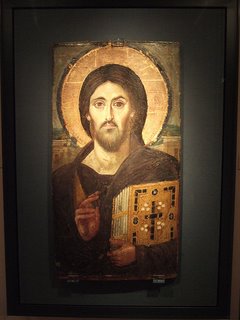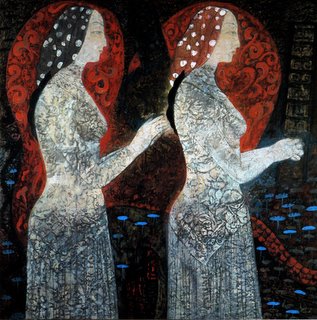 These cruisers own; they are so manly. For Pascha I am going to try to get a pair of these babies for my tender toosties. Batman shoes, good red wine, some aromatic pipe smoke and some meat and cheese: I will be giving up thanks to the Big Guy! Bring on Pascha, yes indeed! I look forward to digging out my hobbit pipe and playing a tune or two on her. How much longer until Pascha is it, again? Ah, time to dig deeply and live out life by grasping with my lenten hands :)
These cruisers own; they are so manly. For Pascha I am going to try to get a pair of these babies for my tender toosties. Batman shoes, good red wine, some aromatic pipe smoke and some meat and cheese: I will be giving up thanks to the Big Guy! Bring on Pascha, yes indeed! I look forward to digging out my hobbit pipe and playing a tune or two on her. How much longer until Pascha is it, again? Ah, time to dig deeply and live out life by grasping with my lenten hands :)
2006-03-28
Batman's chucks!
 These cruisers own; they are so manly. For Pascha I am going to try to get a pair of these babies for my tender toosties. Batman shoes, good red wine, some aromatic pipe smoke and some meat and cheese: I will be giving up thanks to the Big Guy! Bring on Pascha, yes indeed! I look forward to digging out my hobbit pipe and playing a tune or two on her. How much longer until Pascha is it, again? Ah, time to dig deeply and live out life by grasping with my lenten hands :)
These cruisers own; they are so manly. For Pascha I am going to try to get a pair of these babies for my tender toosties. Batman shoes, good red wine, some aromatic pipe smoke and some meat and cheese: I will be giving up thanks to the Big Guy! Bring on Pascha, yes indeed! I look forward to digging out my hobbit pipe and playing a tune or two on her. How much longer until Pascha is it, again? Ah, time to dig deeply and live out life by grasping with my lenten hands :)
2006-03-26
Jack Johnson and Curious George
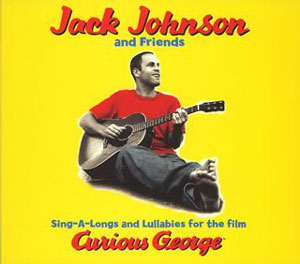 Somethings go together, like rapsberry jam and butter on sourdough toast. Other things don't fit so well, at least on the surface. I came across this latest offering from Jack Johnson while searching for some Ben Harper music. But it would be better to say, "I stumbled upon it;" because I did stumble spiritually by starting to think ill thoughts of Jack for working on this project in the first place. I mean seeing this soundtrack by Jack Johnson for this movie was much along the lines of running into Queen Elizabeth while at a strip joint or at the neighbourhood drug dealer's home: "...... excuse me, what are you doing here....moreover, why am I here?" Consider that even my children wouldn't want to see the movie for this soundtrack. And that shows good taste. Does anyone know whether this music is worth checking out? I like Jack Johnson's music, but I hesitate with this Curious George soundtrack. Let me know what you know in the comments.
Somethings go together, like rapsberry jam and butter on sourdough toast. Other things don't fit so well, at least on the surface. I came across this latest offering from Jack Johnson while searching for some Ben Harper music. But it would be better to say, "I stumbled upon it;" because I did stumble spiritually by starting to think ill thoughts of Jack for working on this project in the first place. I mean seeing this soundtrack by Jack Johnson for this movie was much along the lines of running into Queen Elizabeth while at a strip joint or at the neighbourhood drug dealer's home: "...... excuse me, what are you doing here....moreover, why am I here?" Consider that even my children wouldn't want to see the movie for this soundtrack. And that shows good taste. Does anyone know whether this music is worth checking out? I like Jack Johnson's music, but I hesitate with this Curious George soundtrack. Let me know what you know in the comments.
2006-03-23
Woe unto them that call evil good
Is. 5:20 reads like a sword of war against equivocation:
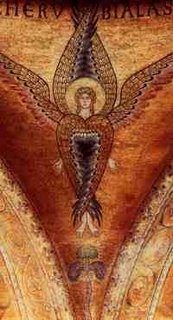
This reversal of values and equivocation continues in our time: . 'Woe unto them that call evil good,' but that is exactly what we have done. We have lost our spiritual focus and reversed our sense of what is virtuous:
We have exploited the poor and called it the lottery. We have rewarded laziness and called it welfare.
We have killed our unborn and called it choice. We have shot abortionists and called it justifiable. We have neglected to discipline our children and called it building self esteem. We have abused power and called it politics. We have coveted our neighbor's possessions and called it ambition. We have polluted the air with profanity and pornography and called it freedom of expression. We have ridiculed the time-honoured virtues of our forefathers and called it enlightenment.
Reading Isaiah is a good way to put a stop to the spiritual wickedness which is equivocation.
Washing clean the concepts we think with and the words we use to express our concepts with is necessary.
This is when it is wise to recall Christ's saying about "Yea and Nay".
In my En.11 classes we are studying Macbeth wherein this concept of equivocating is very important to understanding how Shakespeare uses the speech of the witches to characterize them as being evil. Hence, anyone who speak such-and-such a way, is that way as a person. Accordingly when we first meet Macbeth, he equivocates, saying, "So foul and fair a day I have not seen." As the story continues the equivocation takes on more serious consequences than merely suggesting there is no distinction between good and foul weather.
Woe unto them that call evil good, and good evil; that put darkness for light, and light for darkness; that put bitter for sweet, and sweet for bitter!

This reversal of values and equivocation continues in our time: . 'Woe unto them that call evil good,' but that is exactly what we have done. We have lost our spiritual focus and reversed our sense of what is virtuous:
We have exploited the poor and called it the lottery. We have rewarded laziness and called it welfare.
We have killed our unborn and called it choice. We have shot abortionists and called it justifiable. We have neglected to discipline our children and called it building self esteem. We have abused power and called it politics. We have coveted our neighbor's possessions and called it ambition. We have polluted the air with profanity and pornography and called it freedom of expression. We have ridiculed the time-honoured virtues of our forefathers and called it enlightenment.
Reading Isaiah is a good way to put a stop to the spiritual wickedness which is equivocation.
Washing clean the concepts we think with and the words we use to express our concepts with is necessary.
This is when it is wise to recall Christ's saying about "Yea and Nay".
2006-03-22
OpenBSD 3.9 on May 1st.
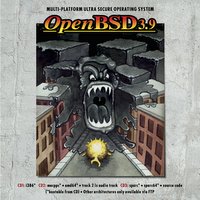
Pre-orders are up for 3.9, so you can all whip out your plastic and support the project. The artwork theme this time is a supremely cool "attack of the binary blob" with a nifty "Stop BLOB!" shirt, aimed against the increasing proliferation of vendor supplied unmaintainable inscrutable binary blob drivers. Wear yours with pride and stick your favourite assinine vendor logo on the back in the blob (now where is my nvidia swag?).
2006-03-21
To School on a Fire Engine
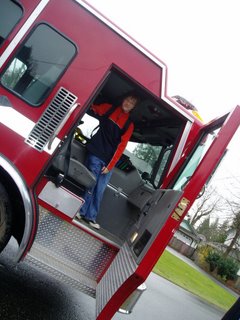 luke and i and two of his friends took a ride to school today on this fire engine. it was cool; we were able to sound the siren, wear fire fighter helmuts, sit in the driver's seat and hang out with two of fort langley's finest fire fighters. when they dropped luke and his buddies off at school, the boys had had a good 30 minute tour. i enjoyed watching luke's face as they arrived at school, being the envy of most other young dudes. he and his friends were 'it' for a brief moment. but that's what happens when you get a lift to school on a fire engine!
luke and i and two of his friends took a ride to school today on this fire engine. it was cool; we were able to sound the siren, wear fire fighter helmuts, sit in the driver's seat and hang out with two of fort langley's finest fire fighters. when they dropped luke and his buddies off at school, the boys had had a good 30 minute tour. i enjoyed watching luke's face as they arrived at school, being the envy of most other young dudes. he and his friends were 'it' for a brief moment. but that's what happens when you get a lift to school on a fire engine!and me in all this? i was just a schmuck who had to walk home after being dropped off at my son's school :P
2006-03-17
St. Ephraim
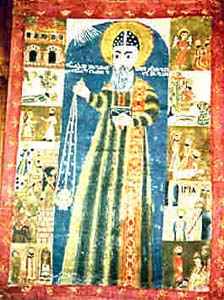
When it came time to name my son I suggested to my wife that one of his middle names be Ephraim, after a great Syrian saint. The name means 'fruitful' or 'prosperous' in its Hebrew etymology and I thought that was a very strong reason for giving my son this as one of his middle names. I am glad Ramone agreed, though her reasons were founded more on the great spiritual insight found in the Lenten prayer composed by St. Ephraim:
O God, cleanse me, a sinner.
O Lord and Master of my life,
take from me the spirit of laziness,
despair, lust for power and idle talk.
But rather the spirit of chastity, humility,
patience and love to your servant.
Yea, O Lord and King,
grant me to see my own sins
and not to judge my brother:
for you are blessed
unto the ages of ages.
O God, cleanse me, a sinner.
Amen.
My favourite line of Saint Ephraim's is from his second of nineteen Hymns on the Nativity of Christ in the Flesh, wherein he writes: "Blessed be the Fruit, Who lowered Himself to fulfill our hunger!" What literary critic would not be drop-jawed at that figure of speech?!
One of St. Ephraim's re-occurring figures of speech is that of Christ as painting a self-image. Speaking of the Jewish law, the Gospels, and nature, he wrote:
You have mixed them together as paints for
your portrait; you have looked at yourself,
and painted your own portrait.
Here is the painter, who in himself has painted
his Father's portrait,
two portrayed, the one in the other...
you in your coming brought it to completion.
Here are a couple photos of the church to which St. Ephraim devoted so much of his energy and a snippet from Wikipedia on St. Ephraim:
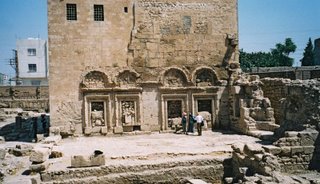
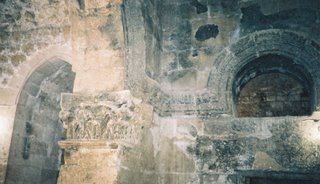
Ephraim was born around the year 306, in the city of Nisibis (the modern Turkish town of Nusaybin, on the border with Syria). Internal evidence from Ephraim's hymnody suggests that both his parents were part of the growing Christian community in the city, although later hagiographers wrote that his father was a pagan priest. Numerous languages were spoken in the Nisibis of Ephraim's day, mostly dialects of Aramaic. The Christian community used the Syriac dialect. Various pagan religions, Judaism and early Christian sects vied with one another for the hearts and minds of the populace. It was a time of great religious and political tension. The Roman Emperor, Diocletian had signed a treaty with his Persian counterpart, Nerses in 298 that transferred Nisibis into Roman hands. The savage persecution and martyrdom of Christians under Diocletian were an important part of Nisibene church heritage as Ephrem grew up.
Jacob, the first bishop of Nisibis was appointed in 308, and Ephraim grew up under his leadership of the community. Jacob of Nisibis is recorded as a signatory at the First Council of Nicea in 325. Ephraim was baptized as a youth, and almost certainly became a son of the covenant, an unusual form of Syrian proto-monasticism. Jacob appointed Ephraim as a teacher (Syriac malp̄ānâ, a title that still carries great respect for Syriac Christians). He was ordained as a deacon either at his baptism or later. He began to compose hymns and write biblical commentaries as part of his educational office. In his hymns, he sometimes refers to himself as a 'herdsman' (`allānâ), to his bishop as the 'shepherd' (rā`yâ) and his community as a 'fold' (dayrâ). Ephraim is popularly credited as the founder of the School of Nisibis, which in later centuries was the centre of learning of the Church of the East.
In 337, Emperor Constantine I, who had legalised and promoted the practice of Christianity in the Roman Empire, died. Seizing on this opportunity, Shapur II of Persia began a series of attacks into Roman North Mesopotamia. Nisibis was besieged in 338, 346 and 350. During the first siege, Ephraim credits Bishop Jacob as defending the city with his prayers. Ephraim's beloved bishop died soon after the event, and Babu led the church through the turbulent times of border skirmishes. In the third siege, of 350, Shapur rerouted the River Mygdonius to undermine the walls of Nisibis. The Nisibenes quickly repaired the walls while the Persian elephant cavalry became bogged down in the wet ground. Ephraim celebrated what he saw as the miraculous salvation of the city in a hymn which portrayed Nisibis as being like Noah's Ark, floating to safety on the flood.
One important physical link to Ephraim's lifetime is the baptistery of Nisibis. The inscription tells that it was constructed under Bishop Vologeses in 359. That was the year that Shapur began to harry the region once again. The cities around Nisibis were destroyed one by one, and their citizens killed or deported. The Roman Empire was preoccupied in the west, and Constantius and Julian, struggled for overall control. Eventually, with Constantius dead, Julian the Apostate began his march into Mesopotamia. He brought with him his increasingly stringent persecutions of Christians. Julian began a foolhardy march against the Persian capital, Ctesiphon, where, overstretched and outnumbered, he was forced into an immediate retreat back along the same road. Julian was killed defending his retreat, and the army elected Jovian as the new emperor. Unlike his predecessor, Jovian was a Nicene Christian. He was forced by circumstances to ask for terms from Shapur, and conceded Nisibis to Persia, with the provision that the city's Christian community would leave. Bishop Abraham, the successor to Vologeses, led his people into exile.
Ephraim found himself among a large group of refugees that fled west, first to Amida (Diyarbakır), and eventually settling in Edessa (modern Şanlıurfa) in 363. Ephraim, in his late fifties, applied himself to ministry in his new church, and seems to have continued his work as a teacher, perhaps in the School of Edessa. Edessa had always been at the heart of the Syriac-speaking world and the city was full of rival philosophies and religions. Ephraim comments that Orthodox Nicene Christians were simply called 'Palutians' in Edessa, after a former bishop. Arians, Marcionites, Manichees, Bardaisanites and various Gnostic sects proclaimed themselves as the true church. In this confusion, Ephraim wrote a great number of hymns defending Nicene Orthodoxy. A later Syriac writer, Jacob of Serugh, wrote that Ephraim rehearsed all-female choirs to sing his hymns set to Syriac folk tunes in the forum of Edessa. After a ten-year residency in Edessa, in his sixties, Ephraim succumbed to the plague as he ministered to its victims. The most reliable date for his death is 9 June 373.
2006-03-13
OpenBSD info & link

If you were ever curious about the operating system I have sometimes posted
about or alluded to by mentioning 'Puffy', then just check out this short interview. It is in .avi format.
2006-03-10
In memory of Simone Weil
While reading this poem Simone Weil had the experience of the presence of Christ. I hope that in reading "Love" by George Herbert, you might get at least a sense of what Simone Weil experienced.
Love
Love bade me welcome, yet my soul drew back,
Guilty of dust and sin.
But quick-ey'd Love, observing me grow slack
From my first entrance in,
Drew nearer to me, sweetly questioning
If I lack'd anything.
"A guest," I answer'd, "worthy to be here";
Love said, "You shall be he."
"I, the unkind, the ungrateful? ah my dear,
I cannot look on thee."
Love took my hand and smiling did reply,
"Who made the eyes but I?"
"Truth, Lord, but I have marr'd them; let my shame
Go where it doth deserve."
"And know you not," says Love, "who bore the blame?"
"My dear, then I will serve."
"You must sit down," says Love, "and taste my meat."
So I did sit and eat.
Love
Love bade me welcome, yet my soul drew back,
Guilty of dust and sin.
But quick-ey'd Love, observing me grow slack
From my first entrance in,
Drew nearer to me, sweetly questioning
If I lack'd anything.
"A guest," I answer'd, "worthy to be here";
Love said, "You shall be he."
"I, the unkind, the ungrateful? ah my dear,
I cannot look on thee."
Love took my hand and smiling did reply,
"Who made the eyes but I?"
"Truth, Lord, but I have marr'd them; let my shame
Go where it doth deserve."
"And know you not," says Love, "who bore the blame?"
"My dear, then I will serve."
"You must sit down," says Love, "and taste my meat."
So I did sit and eat.
2006-03-09
Beginning....a puzzle.
A man went searching for the beginning of the road he was traveling. He traced his footsteps back the way he had come, until he came to where he started. But the beginning of the road was not a beginning. Something lay on the far side of the road's beginning, a beginning before the beginning. And the road had no sooner begun than the beginning was over, and the road itself appeared.
There was a man who sought a spring. He wanted to locate a spring that was nothing but a spring, not a spring that had a stream of water flowing from it from it. No matter where he searched, he found only springs with streams. He could not find a pure spring, a spring uncorrupted by a supplemental flow of water.
He went home in despair, and on his way met the man looking for the beginning of the road. They found a roadside tavern, and went in for a pint.
There was a man who sought a spring. He wanted to locate a spring that was nothing but a spring, not a spring that had a stream of water flowing from it from it. No matter where he searched, he found only springs with streams. He could not find a pure spring, a spring uncorrupted by a supplemental flow of water.
He went home in despair, and on his way met the man looking for the beginning of the road. They found a roadside tavern, and went in for a pint.
...do battle against him...
The self-evidencing power of truth.
The word of truth is free, and carries its own authority, disdaining to fall under any skilful argument, or to endure the logical scrutiny of its hearers. But it would be believed for its own nobility, and for the confidence due to Him who sends it. Now the word of truth is sent from God; wherefore the freedom claimed by the truth is not arrogant. For being sent with authority, it were not fit that it should be required to produce proof of what is said; since neither is there any proof beyond itself, which is God. For every proof is more powerful and trustworthy than that which it proves; since what is disbelieved, until proof is produced, gets credit when such proof is produced, and is recognised as being what it was stated to be. But nothing is either more powerful or more trustworthy than the truth; so that he who requires proof of this is like one who wishes it demonstrated why the things that appear to the senses do appear. For the test of those things which are received through the reason, is sense; but of sense itself there is no test beyond itself. As then we bring those things which reason hunts after, to sense, and by it judge what kind of things they are, whether the things spoken be true or false, and then sit in judgment no longer, giving full credit to its decision; so also we refer all that is said regarding men and the world to the truth, and by it judge whether it be worthless or no.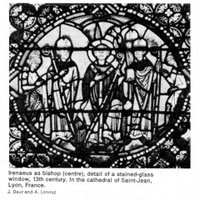 But the utterances of truth we judge by no separate test, giving full credit to itself. And God, the Father of the universe, who is the perfect intelligence, is the truth. And the Word, being His Son, came to us, having put on flesh, revealing both Himself and the Father, giving to us in Himself resurrection from the dead, and eternal life afterwards. And this is Jesus Christ, our Saviour and Lord. He, therefore, is Himself both the faith and the proof of Himself and of all things. Wherefore those who follow Him, and know Him, having faith in Him as their proof, shall rest in Him. But since the adversary does not cease to resist many, and uses many and divers arts to ensnare them, that he may seduce the faithful from their faith, and that he may prevent the faithless from believing, it seems to me necessary that we also, being armed with the invulnerable doctrines of the faith, do battle against him in behalf of the weak.
But the utterances of truth we judge by no separate test, giving full credit to itself. And God, the Father of the universe, who is the perfect intelligence, is the truth. And the Word, being His Son, came to us, having put on flesh, revealing both Himself and the Father, giving to us in Himself resurrection from the dead, and eternal life afterwards. And this is Jesus Christ, our Saviour and Lord. He, therefore, is Himself both the faith and the proof of Himself and of all things. Wherefore those who follow Him, and know Him, having faith in Him as their proof, shall rest in Him. But since the adversary does not cease to resist many, and uses many and divers arts to ensnare them, that he may seduce the faithful from their faith, and that he may prevent the faithless from believing, it seems to me necessary that we also, being armed with the invulnerable doctrines of the faith, do battle against him in behalf of the weak.
There is nothing like St. Irenæus to get me more firmly behind the Lenten discipline; I hope his manly logic lifted your spirits a bit.
The word of truth is free, and carries its own authority, disdaining to fall under any skilful argument, or to endure the logical scrutiny of its hearers. But it would be believed for its own nobility, and for the confidence due to Him who sends it. Now the word of truth is sent from God; wherefore the freedom claimed by the truth is not arrogant. For being sent with authority, it were not fit that it should be required to produce proof of what is said; since neither is there any proof beyond itself, which is God. For every proof is more powerful and trustworthy than that which it proves; since what is disbelieved, until proof is produced, gets credit when such proof is produced, and is recognised as being what it was stated to be. But nothing is either more powerful or more trustworthy than the truth; so that he who requires proof of this is like one who wishes it demonstrated why the things that appear to the senses do appear. For the test of those things which are received through the reason, is sense; but of sense itself there is no test beyond itself. As then we bring those things which reason hunts after, to sense, and by it judge what kind of things they are, whether the things spoken be true or false, and then sit in judgment no longer, giving full credit to its decision; so also we refer all that is said regarding men and the world to the truth, and by it judge whether it be worthless or no.
 But the utterances of truth we judge by no separate test, giving full credit to itself. And God, the Father of the universe, who is the perfect intelligence, is the truth. And the Word, being His Son, came to us, having put on flesh, revealing both Himself and the Father, giving to us in Himself resurrection from the dead, and eternal life afterwards. And this is Jesus Christ, our Saviour and Lord. He, therefore, is Himself both the faith and the proof of Himself and of all things. Wherefore those who follow Him, and know Him, having faith in Him as their proof, shall rest in Him. But since the adversary does not cease to resist many, and uses many and divers arts to ensnare them, that he may seduce the faithful from their faith, and that he may prevent the faithless from believing, it seems to me necessary that we also, being armed with the invulnerable doctrines of the faith, do battle against him in behalf of the weak.
But the utterances of truth we judge by no separate test, giving full credit to itself. And God, the Father of the universe, who is the perfect intelligence, is the truth. And the Word, being His Son, came to us, having put on flesh, revealing both Himself and the Father, giving to us in Himself resurrection from the dead, and eternal life afterwards. And this is Jesus Christ, our Saviour and Lord. He, therefore, is Himself both the faith and the proof of Himself and of all things. Wherefore those who follow Him, and know Him, having faith in Him as their proof, shall rest in Him. But since the adversary does not cease to resist many, and uses many and divers arts to ensnare them, that he may seduce the faithful from their faith, and that he may prevent the faithless from believing, it seems to me necessary that we also, being armed with the invulnerable doctrines of the faith, do battle against him in behalf of the weak.There is nothing like St. Irenæus to get me more firmly behind the Lenten discipline; I hope his manly logic lifted your spirits a bit.
2006-03-02
Epistle of Mathetes to Diognetus
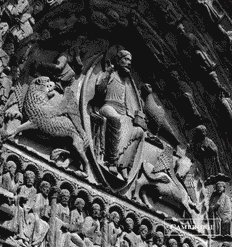
This epistle admirably illustrates the temper taught by St. Paul (2 Tim. ii. 24), and not less the peculiar social relations of converts to the Gospel. Mathetes was possibly a catechumen of St. Paul or of one of the apostles. Many scholars think that his correspondent, Diognetus, was the tutor of M. Aurelius. The author names himself as Mathetes, but no one can say more of his identity. What interests me is the description he gives of early Church communities. Do you think Mathetes is describing the communities in an ideal or realistic manner? I am inclined to think 'both' for my answer. Read this excerpt and decide for yourself:
For the Christians are distinguished from other men neither by country, nor language, nor the customs which they observe. For they neither inhabit cities of their own, nor employ a peculiar form of speech, nor lead a lifewhich is marked out by any singularity. The course of conduct which they follow has not been devised by any speculation or deliberation of inquisitive men; nor do they, like some, proclaim themselves the advocates of any merely human doctrines.But, inhabiting Greek as well as barbarian cities, according as the lot of each of them has determined, and following the customs of the natives in respect to clothing, food, and the rest of their ordinary conduct, they display to us their wonderful and confessedly striking method of life. They dwell in their own countries, but simply as sojourners. As citizens, they share in all things with others, and yet endure all things as if foreigners. Every foreign land is to them as their native country, and every land of their birth as a land of strangers. They marry, as do all others; they beget children; but they do not destroy their offspring. They have a common table, but not a common bed. They are in the flesh, but they do not live after the flesh. They pass their days on earth, but they are citizens of heaven. They obey the prescribed laws, and at the same time surpass the laws by their lives. They love all men, and are persecuted by all. They are unknown and condemned; they are put to death, and restored to life. They are poor, yet make many rich; they are in lack of all things, and yet abound in all; they are dishonoured, and yet in their very dishonour are glorified. They are evil spoken of, and yet are justified; they are reviled, and bless; they are insulted, and repay the insult with honour; they do good, yet are punished as evil-doers. When punished, they rejoice as if quickened into life; they are assailed by the Jews as foreigners, and are persecuted by the Greeks; yet those who hate them are unable to assign any reason for their hatred.
So we read about surpassing the legal expectations of the secular laws; not destroying our babies; not condoning adultery. These three stand out as extremely early representations of Orthodox ethical notions. Also, the whole attitude of turning the other cheek and being rich through having little bleeds throughout the epistle and it astounds and inspires me. This epistle is a lot like the Didache in that it is more revelant and fresh than even the morning news! Why is it that Irenaeus, Ignatius and Clement are still such manly and pertinent figures?
2006-02-26
Bad Hair and other Hard Truths
 Let's be straight about this image: these people have spent way too much time grooming way too much hair with way too much hair spray. I mean the hard truth is that the hair style evident here is so 'jungle frew-frew' it is just begging to be hacked back. You'd need a weed whacker to take off enough to make a visible difference. I have no idea who decided that this style of hair was groovy, but we'd all agree that this way of setting hair is just embarrassing. But it is a hard truth -- albeit a funny hard truth -- to admit that many normal, hard-working middle-class folks in the 1970s actually thought this style rocked: anyone recall the Bay City Rollers? And do look more closely at the photo: doesn't that young family seem delighted with their 'jungle frew-frew' hairdos? You better believe it! "S-A-T-U-R-D-A-Y Night!" or "Let the good times roll...let them brush your rock 'n' roll hair, let them leave you up in the air..." Oh the frew-frew jungle blues!
Let's be straight about this image: these people have spent way too much time grooming way too much hair with way too much hair spray. I mean the hard truth is that the hair style evident here is so 'jungle frew-frew' it is just begging to be hacked back. You'd need a weed whacker to take off enough to make a visible difference. I have no idea who decided that this style of hair was groovy, but we'd all agree that this way of setting hair is just embarrassing. But it is a hard truth -- albeit a funny hard truth -- to admit that many normal, hard-working middle-class folks in the 1970s actually thought this style rocked: anyone recall the Bay City Rollers? And do look more closely at the photo: doesn't that young family seem delighted with their 'jungle frew-frew' hairdos? You better believe it! "S-A-T-U-R-D-A-Y Night!" or "Let the good times roll...let them brush your rock 'n' roll hair, let them leave you up in the air..." Oh the frew-frew jungle blues!Some truths are hard to grasp while others are hard to take in because they demand of us a difficult course of action or choice. Most hard truths follow the latter description, involving so much more than dealing with evidence that clearly shows you had an extremely poor sense of aesthetic judgment. Indeed, the hardest truths I can think of are these:
1. there is no eternal security; we must trust only in Christ's mercy
2. the two ultimate choices: we saying "yes" to God's will or God saying "yes" to our will.
3. not everyone will find blessedness
4. heaven may involve even longer and more frequent liturgies :p
5. you must hold your hands out in love to those you dislike
What are the hardest truths for you?
2006-02-25
Unrelated remarks
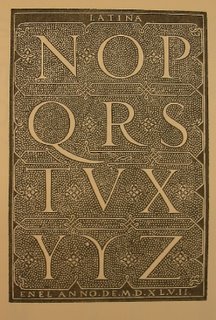
A while ago we went to see the Picasso exhibit at the Vancouver Art Gallery. It amazes me that Picasso was so successful in his own lifetime; he was wealthy and lived a life of luxury and ease. This painting of the bombing of the Basque village, Guernica, has always held my imagination in horror. When someone asks me whether the beautiful is to be equated with that which gives pleasure, I always use this painting in my answer. For this work is beautiful but it gives me no pleasure at all; in contemplating the images, you will notice only horror, loss and brutuality. Hardly giving a normal manly man pleasure. Therefore the beautiful is not another way of saying 'that which gives pleasure'.
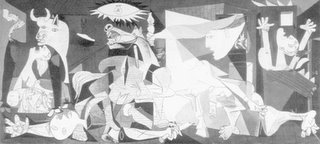 What do you think the Latin lettering is for?
What do you think the Latin lettering is for?
2006-02-21
Winter Frost
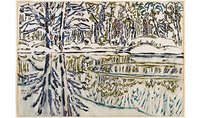 The Winter Olympics are running and Canada has owned the rink. It is rather lame that we haven't excelled that well in snowboarding. One bronze medal is lame for a snowboarding capital of the world! In hockey we are starting to get business accomplished; our women's hockey team has won the gold! Truly they seemed unbeatable. Our men are having a tough time getting to be a 'team'. Perhaps a few set-backs will do them good service: it may pull them closer together. The men's team needed a slap upside the head and both the Swiss and the Finns delivered a couple of smashing wake-you-up uppercuts. I think the Canuckleheads will pull together as a manly national team should; and I hope we get to see our manly squad play in the final, crushing the Finns. Oh, baby, that would be better than butter on a fresh cinnamon bun!
The Winter Olympics are running and Canada has owned the rink. It is rather lame that we haven't excelled that well in snowboarding. One bronze medal is lame for a snowboarding capital of the world! In hockey we are starting to get business accomplished; our women's hockey team has won the gold! Truly they seemed unbeatable. Our men are having a tough time getting to be a 'team'. Perhaps a few set-backs will do them good service: it may pull them closer together. The men's team needed a slap upside the head and both the Swiss and the Finns delivered a couple of smashing wake-you-up uppercuts. I think the Canuckleheads will pull together as a manly national team should; and I hope we get to see our manly squad play in the final, crushing the Finns. Oh, baby, that would be better than butter on a fresh cinnamon bun!This frosty watercolor painting is lovely. It reminds me of the winters during my youth when we used to get more snowfall.
2006-02-20
OliveBSD
 Go get it here. Burn that onto a cd and then you can boot up OpenBSD 3.8 with a nice graphical user interface. It is an easy and free way to use the most secure operating system currently available. As an aside, olive trees are remarkable in that they bloom prior to growing their leaves. It was this trait that made it the species to represent the White Tree of Gondor in The Return of the King. I sometimes enjoy imagining what those White Trees of Valinor would have looked like in all their radiance.
Go get it here. Burn that onto a cd and then you can boot up OpenBSD 3.8 with a nice graphical user interface. It is an easy and free way to use the most secure operating system currently available. As an aside, olive trees are remarkable in that they bloom prior to growing their leaves. It was this trait that made it the species to represent the White Tree of Gondor in The Return of the King. I sometimes enjoy imagining what those White Trees of Valinor would have looked like in all their radiance.
2006-02-15
Quilts
This post is about quilts and why I love them. I want to say at the outset that it is very manly to enjoy quilts. The craftsmanship in making them is not for me to put down or joke at; I highly respect those who design and craft these comforting treasures. However, I am not advocating that manly men start doing this craft; but if you are faced with a choice between taking up quilting or taking up figure skating, I'd say the manly man would choose the former if faced with such a dilemma. Now let's view some of my favourite types.
I have always loved homemade quilts. These days the blankets that are commonly sold are lame in comparison. The industrial revolution ruined things for many an artisan, the textile craftsman not least. That said one can still find good, heavy quilts around. My father's mother was an avid quilt maker until her death. She made me 3 quilts throughout my childhood. The last one she crafted has served me for the last 26 years. And that quilt has seen 26 yrs. of steady use; it went with me to university, it lived through my life as a bachelor; it has been a joy to Ramone and I during our slumbertimes. I love -- absolutely love -- heavy, weighty and manly quilts made with a wool core. Oh baby, can you say Thomas go have a restful and content snooooooze? These old friendship quilts are superbly crafted.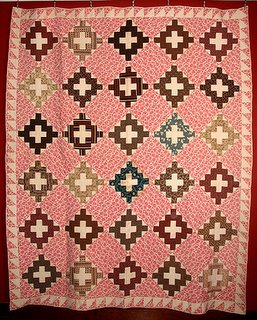 The crazy brokendishes design is by some old mennonites; I will forgive them for their theological errors because they made such splendid blankets. It is interesting to note in passing that my grandmother wouldn't have wrapped her or her children in a such a blanket because those perceived theological errors.
The crazy brokendishes design is by some old mennonites; I will forgive them for their theological errors because they made such splendid blankets. It is interesting to note in passing that my grandmother wouldn't have wrapped her or her children in a such a blanket because those perceived theological errors.
So close was a person to the work that its very presence was thought to be blessed or cursed by the form that the maker's mind crafted it with; and if in that mind there were theological or moral ideas that could contaminate other forms or ideas? Well, so much for resting contentedly in a mennonite blanket that could've been contaminated with bad religion. At least they took art extremely seriously!
I love this brokendish design which I am told was a favourite of mennonites; I can just picture my grandmother somehow enjoying the verbal irony of the quilt type and linking it to the followers of Menno Friesen.
This last quilt is a very heavy one, being made of wool. It is just the sort of blanket I would love to wrap myself up in.
The weight, the density of the material is not only warm and soothing, but also it helps to hold you still, suspended, care-free and gives you some respice at the close of a hard day's work.
Oh yea, bring it on! I can just see myself enjoying a good slumber under this one. I hope you enjoyed a peak at some of my favourite quilts.
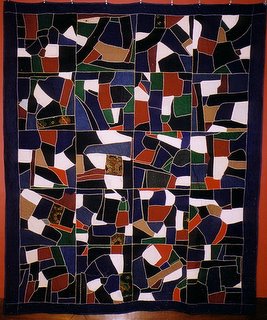

I have always loved homemade quilts. These days the blankets that are commonly sold are lame in comparison. The industrial revolution ruined things for many an artisan, the textile craftsman not least. That said one can still find good, heavy quilts around. My father's mother was an avid quilt maker until her death. She made me 3 quilts throughout my childhood. The last one she crafted has served me for the last 26 years. And that quilt has seen 26 yrs. of steady use; it went with me to university, it lived through my life as a bachelor; it has been a joy to Ramone and I during our slumbertimes. I love -- absolutely love -- heavy, weighty and manly quilts made with a wool core. Oh baby, can you say Thomas go have a restful and content snooooooze? These old friendship quilts are superbly crafted.
 The crazy brokendishes design is by some old mennonites; I will forgive them for their theological errors because they made such splendid blankets. It is interesting to note in passing that my grandmother wouldn't have wrapped her or her children in a such a blanket because those perceived theological errors.
The crazy brokendishes design is by some old mennonites; I will forgive them for their theological errors because they made such splendid blankets. It is interesting to note in passing that my grandmother wouldn't have wrapped her or her children in a such a blanket because those perceived theological errors. So close was a person to the work that its very presence was thought to be blessed or cursed by the form that the maker's mind crafted it with; and if in that mind there were theological or moral ideas that could contaminate other forms or ideas? Well, so much for resting contentedly in a mennonite blanket that could've been contaminated with bad religion. At least they took art extremely seriously!
I love this brokendish design which I am told was a favourite of mennonites; I can just picture my grandmother somehow enjoying the verbal irony of the quilt type and linking it to the followers of Menno Friesen.

This last quilt is a very heavy one, being made of wool. It is just the sort of blanket I would love to wrap myself up in.
The weight, the density of the material is not only warm and soothing, but also it helps to hold you still, suspended, care-free and gives you some respice at the close of a hard day's work.
Oh yea, bring it on! I can just see myself enjoying a good slumber under this one. I hope you enjoyed a peak at some of my favourite quilts.

2006-02-12
Canadian Olympic Hockey: can we cheer?!
Our men's and women's teams are posed to defend the Gold; in the coming two weeks we expect to see a couple of scenes like this one:
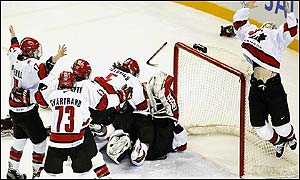
Let's forget about the figure skating, it is so lame and way too subjective. Remember 2002 when figure skating vomited all over itself on the international stage? I don't know why anyone likes to watch it anyway. It seems to attract mostly effeminate men to the sport. Think about it, what type of guy would rather go practise his ice dancing routine over going to a hockey practice or over going snowboarding??! Enough said; that was a rhetorical question, we know it is a Brokeback-Mountain sort of guy. Furthermore, who gives a rip about figure skating when compared to hockey or snowboarding or skiing? It bothers me that there are people who do not recognize just how lame and unmanly figure skating is; yet this fact only really bothers me because of the effect it has on the broadcasting of the olympic events. The CBC broadcasts hours of the artistic malarkey and they do so because lots of people want to see it. To me watching figure skating is on par with reading and valuing astrology or harnessing the creative energies of crystals. I mean let's get real, no manly man believes people can cast spells or that stars and planets have anything to do with how financial investiments will fare on a given day. "Oh, excuse me while I consult my $50.00 crystal to determine whether the 'creative energy' is right for investing with you...or to find out if I should cheer for the Russians or Chinese in ice dancing???!" It is all unmanly and terribly superstitious and full of horse hockey pucks! Give ice skating a rest, instead cheer for the hockey, snowboarding and skiing. Curling is much more manly than figure skating; they bang their rocks together to make a very manly sound: arggggh!
Or something like that :p
Go Team Canada!

Let's forget about the figure skating, it is so lame and way too subjective. Remember 2002 when figure skating vomited all over itself on the international stage? I don't know why anyone likes to watch it anyway. It seems to attract mostly effeminate men to the sport. Think about it, what type of guy would rather go practise his ice dancing routine over going to a hockey practice or over going snowboarding??! Enough said; that was a rhetorical question, we know it is a Brokeback-Mountain sort of guy. Furthermore, who gives a rip about figure skating when compared to hockey or snowboarding or skiing? It bothers me that there are people who do not recognize just how lame and unmanly figure skating is; yet this fact only really bothers me because of the effect it has on the broadcasting of the olympic events. The CBC broadcasts hours of the artistic malarkey and they do so because lots of people want to see it. To me watching figure skating is on par with reading and valuing astrology or harnessing the creative energies of crystals. I mean let's get real, no manly man believes people can cast spells or that stars and planets have anything to do with how financial investiments will fare on a given day. "Oh, excuse me while I consult my $50.00 crystal to determine whether the 'creative energy' is right for investing with you...or to find out if I should cheer for the Russians or Chinese in ice dancing???!" It is all unmanly and terribly superstitious and full of horse hockey pucks! Give ice skating a rest, instead cheer for the hockey, snowboarding and skiing. Curling is much more manly than figure skating; they bang their rocks together to make a very manly sound: arggggh!
Or something like that :p
Go Team Canada!
2006-02-08
beauty
2006-02-06
the four parts to a question: for Vic
4 jobs:
1. Teacher: I've taught for 15 years.
2. Gill Net Fisherman: I gill net fished for salmon for a couple of summers.
3. Seine Net Fisherman: I worked on board the Westview III for a couple of summers; I was a tie-up man or beachman. It was in the days when I was a fast runner: in gr.12 I ran a 100m sprint in 11.46s! And a good beachman had to haul his chops up and down slippery rocks, all the while looking for something to tie up on.
4. Burnaby Parks and Recreation: during the summer of Expo 86 I worked as a mobile playwriter. My partner and I would get a week to compose a skit, practise it, find costumes and props; then we would do two shows per day in two different parks per day (one am show, one pm show) over the next two weeks. Then we'd repeat the three week cycle again. We did a nine week stint to great reviews for all three skits! Hehe, it was my summer as Professor Percy Bumble, a bumbling inventor who had various adventures:) And I got to use a Burnaby Parks and Recreation Van to get around; at night I would hang out doing all sorts of silly things with my roomie, Tom Hooper, a bassist for the Grapes of Wrath.
4 movies I could watch over and over...
1. A Man for All Seasons (Paul Scofield)
2. The Godfather I/II (they are connected)
3. Ikiru/The Matrix
4. A River Runs Through It
4 places i've lived:
1. Vancouver: I went to Lord Kitchener Elementary K-3
2. Victoria: We lived on Thompson Bay Rd by Oak Bay Park Pre-school years
3. Toronto: Only there for gr. 3-4. I hated Toronto. I still do. It is a pussy-footed,
liberal-minded part of a wannabe-cultured city that has no culture that isn't superficial.
When we moved to Calgary for my gr.5-6, I could start to think and breath and do things in
the mountain heights!
4. Fort Langley: I live here and I love it; it is so groovy. Just ask Vic, she'll tell you how
cool it is.
4 albums:
1. Led Zeppelin I/II/III/IV
2. Neil Young: Harvest
3. John R. Cash: Live at Folsom Prison
4. So many others...Feist, Sarah Harmer, Bob Dylan, The Beatles, Nirvana: Bleach, The White
Stripes, Bach, Mozart, Billie Holiday, Bessie Smith, Coleman Hawkins, Louis Armstrong,
Pink Floyd, etc..
4 fiction writers:
1. C.S.Lewis
2. Tolkein
3. Joyce
4. Dostoevsky
4 poets:
1. Herbert
2. Homer/Pindar
3. Rumi
4. Donne
4 Playwriters:
1. Shakespeare
2. Robert Bolt
3. Sophocles
4. Anton Chekov
4 non-fiction writers:
1. Jean Danielou
2. Vladmir Lossky
3. CS Lewis
4. George Grant
4 Philosophers:
1. Plato
2. Aristotle
3. Thomas Aquinas
4. Simone Weil
4 heroes:
1. Christ
2. St. Paul
3. Mary, the mother of my Lord
4. any truly manly man
4 vacations:
1. Chaunigan Lake
---I have not been on a vacation as an adult other than to Chaunigan Lake.
4 foods:
1. Jim's Pizza: In Fort Langley. The Rustic Italian and House Special (with slight manly substitutions) Id Est, add feta to both; remove pineapple, add roasted garlic to the house special; remove tomato, add roasted garlic to the rustic italian. though the rustic is good with the tomato, but i just prefer the garlic because it is manlier. -edited so as to clarify matters for Victoria
2. Prime Rib
3. Greek Food
4. Chinese Food
4 places i'd rather be:
1. Fly Fishing
2. Not working
3. reading what I want
4. hanging out with friends
4 sites:
1. www.openbsd.org
2. www.undeadly.org
3. blogs I visit
4. google.ca and imdb.com
4 bloggers to whom i'm passing this burden:
1. luke
2. hannah
3. ramone
4. davido
1. Teacher: I've taught for 15 years.
2. Gill Net Fisherman: I gill net fished for salmon for a couple of summers.
3. Seine Net Fisherman: I worked on board the Westview III for a couple of summers; I was a tie-up man or beachman. It was in the days when I was a fast runner: in gr.12 I ran a 100m sprint in 11.46s! And a good beachman had to haul his chops up and down slippery rocks, all the while looking for something to tie up on.
4. Burnaby Parks and Recreation: during the summer of Expo 86 I worked as a mobile playwriter. My partner and I would get a week to compose a skit, practise it, find costumes and props; then we would do two shows per day in two different parks per day (one am show, one pm show) over the next two weeks. Then we'd repeat the three week cycle again. We did a nine week stint to great reviews for all three skits! Hehe, it was my summer as Professor Percy Bumble, a bumbling inventor who had various adventures:) And I got to use a Burnaby Parks and Recreation Van to get around; at night I would hang out doing all sorts of silly things with my roomie, Tom Hooper, a bassist for the Grapes of Wrath.
4 movies I could watch over and over...
1. A Man for All Seasons (Paul Scofield)
2. The Godfather I/II (they are connected)
3. Ikiru/The Matrix
4. A River Runs Through It
4 places i've lived:
1. Vancouver: I went to Lord Kitchener Elementary K-3
2. Victoria: We lived on Thompson Bay Rd by Oak Bay Park Pre-school years
3. Toronto: Only there for gr. 3-4. I hated Toronto. I still do. It is a pussy-footed,
liberal-minded part of a wannabe-cultured city that has no culture that isn't superficial.
When we moved to Calgary for my gr.5-6, I could start to think and breath and do things in
the mountain heights!
4. Fort Langley: I live here and I love it; it is so groovy. Just ask Vic, she'll tell you how
cool it is.
4 albums:
1. Led Zeppelin I/II/III/IV
2. Neil Young: Harvest
3. John R. Cash: Live at Folsom Prison
4. So many others...Feist, Sarah Harmer, Bob Dylan, The Beatles, Nirvana: Bleach, The White
Stripes, Bach, Mozart, Billie Holiday, Bessie Smith, Coleman Hawkins, Louis Armstrong,
Pink Floyd, etc..
4 fiction writers:
1. C.S.Lewis
2. Tolkein
3. Joyce
4. Dostoevsky
4 poets:
1. Herbert
2. Homer/Pindar
3. Rumi
4. Donne
4 Playwriters:
1. Shakespeare
2. Robert Bolt
3. Sophocles
4. Anton Chekov
4 non-fiction writers:
1. Jean Danielou
2. Vladmir Lossky
3. CS Lewis
4. George Grant
4 Philosophers:
1. Plato
2. Aristotle
3. Thomas Aquinas
4. Simone Weil
4 heroes:
1. Christ
2. St. Paul
3. Mary, the mother of my Lord
4. any truly manly man
4 vacations:
1. Chaunigan Lake
---I have not been on a vacation as an adult other than to Chaunigan Lake.
4 foods:
1. Jim's Pizza: In Fort Langley. The Rustic Italian and House Special (with slight manly substitutions) Id Est, add feta to both; remove pineapple, add roasted garlic to the house special; remove tomato, add roasted garlic to the rustic italian. though the rustic is good with the tomato, but i just prefer the garlic because it is manlier. -edited so as to clarify matters for Victoria
2. Prime Rib
3. Greek Food
4. Chinese Food
4 places i'd rather be:
1. Fly Fishing
2. Not working
3. reading what I want
4. hanging out with friends
4 sites:
1. www.openbsd.org
2. www.undeadly.org
3. blogs I visit
4. google.ca and imdb.com
4 bloggers to whom i'm passing this burden:
1. luke
2. hannah
3. ramone
4. davido
2006-02-04
Boom, drizzle, crack! and some baby talk...
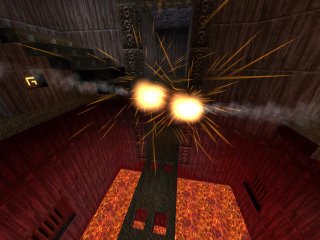 I love the wind and the rain; and I love chocolate and cinnamon buns. But too much of a good thing is too much, excessive, over-done, a lot of plenty, etc., etc.. I heard that twins have been born to Deanna and Peter; moreover I am given to understand that the boy is named Thomas. I'd like to congratulate the parents on having the good sense to use such a manly name. The baby girl's name is Elizabeth; and I do have a fondness for that name, too, even though I do not utilize the name. Thomas the baby: what an outstanding name to grow up with and to grow into. Arrrgggh!
I love the wind and the rain; and I love chocolate and cinnamon buns. But too much of a good thing is too much, excessive, over-done, a lot of plenty, etc., etc.. I heard that twins have been born to Deanna and Peter; moreover I am given to understand that the boy is named Thomas. I'd like to congratulate the parents on having the good sense to use such a manly name. The baby girl's name is Elizabeth; and I do have a fondness for that name, too, even though I do not utilize the name. Thomas the baby: what an outstanding name to grow up with and to grow into. Arrrgggh! Gabe and Amy had a boy with a fine name, too: Owen. What is especially cool about the Little O-man's name is the pronounciation of the initials of his three given or Christian names: O + P + E or 'Oppie'; as, for instance, in the little kid played by Ron Howard on the old Andy Griffith Show. Owen is one of my favourite names. In fact, if Ramone and I were to have a divinely sent accident in the form of another male baby, we'd probably name him Henry Owen Thomas; and yes he'd be one HOT! baby I am sure!
Congratulations to Amy, Gabe, Peter and Deanna on the recent arrivals. May you be given the strength, honour and wisdom to raise them well!
I sure do hope to see some sunshine soon.
Subscribe to:
Posts (Atom)
